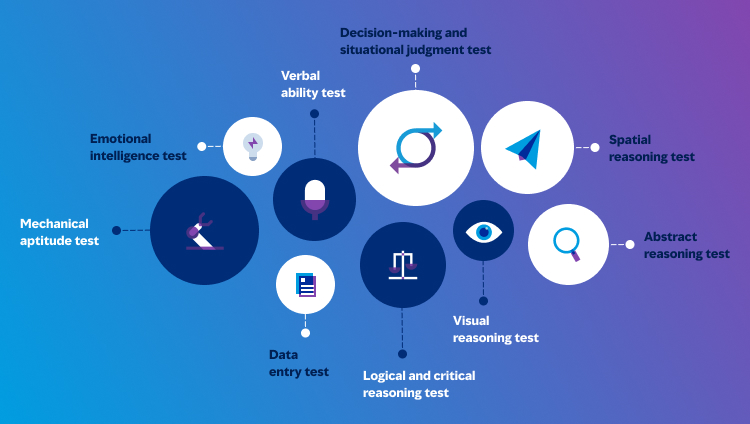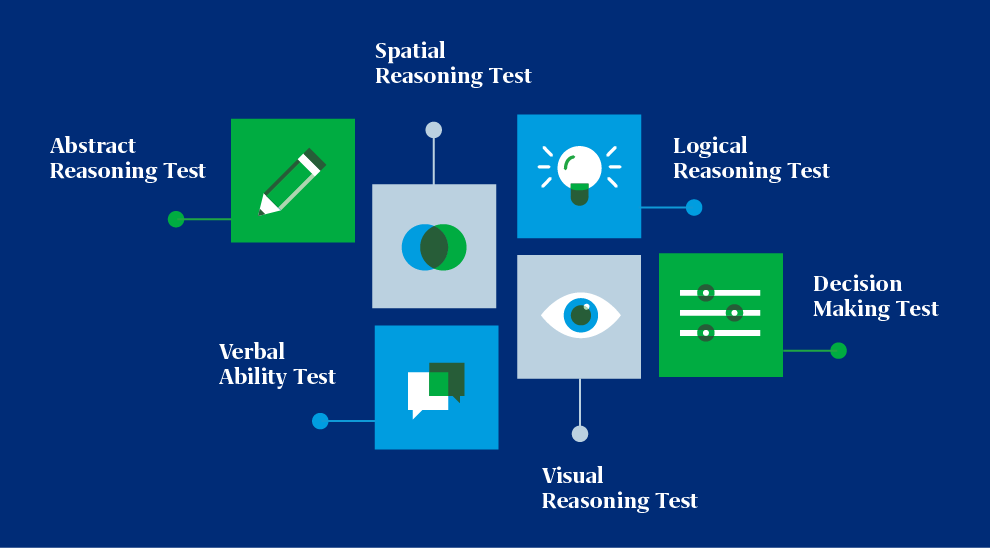Abstract Reasoning Test
Abstract reasoning tests assess a candidate’s ability to think laterally and from a unique perspective. They consider an individual’s ability to make logical connections between the available sets of information. A high level of abstract reasoning is related to creativity and helps solve novel problems. Therefore, learning new skills is easy for people with strong abstract reasoning abilities as they can process ambiguous information effectively.
Organizations seeking to assess problem-solving and thinking skills of candidates can do so with Mercer | Mettl’s Abstract Reasoning Test. The test measures a candidate’s ability to think creatively, approach problems with a fresh perspective, and draw logical connections between diverse concepts.
Spatial reasoning test
Spatial reasoning tests measure a candidate’s ability to understand an object’s spatial distribution and movement. These include the skills to innovate and implement new ideas with a visual perspective.
Mercer | Mettl’s Spatial Reasoning Test measures a candidate’s ability to mentally re-arrange, rotate, and manipulate shapes without touching them, helping identify applicants with high spatial intelligence.
Decision-making and situational judgment test
Decision-making is an employee’s ability to assess various aspects of a problem and decide on a solution using skills and acquired knowledge. Hence, decision-making tests include situational questions that require the candidate to demonstrate sound judgment.
Decision-making is an essential leadership quality that helps find innovative solutions to problems. Good decision-making is directly related to an organization’s overall productivity.
Verbal ability test
Verbal ability tests assess an individual’s ability to use a language efficiently. An excellent command of language is a critical aspect of ensuring effective communication. Therefore, these tests help assess future communication with colleagues, clients, management, and other stakeholders.
Mercer | Mettl’s Verbal Ability Assessment evaluates the candidate’s ability to read, retain, process, and synthesize high amounts of written information and swiftly comprehend large pieces of written text.
Logical and critical reasoning test
This test helps evaluate the candidates on their logical inference. It assesses the candidate’s ability to draw sensible conclusions based on given information and statements. Logical thinking is critical in daily life and various business scenarios. Likewise, critical thinking is a creative approach to problem-solving involving validation through a critical lens. Mercer | Mettl’s Logical Reasoning Test measures a candidate’s ability to analyze information from different perspectives by breaking it down into components, organizing it logically, and exploring the relationships between various information points to find a solution. In addition, Mercer | Mettl offers a Critical Thinking Test that assesses candidates’ ability to identify assumptions, test arguments, and draw valid conclusions.
Visual reasoning test
Visual reasoning is an effective tool for analyzing visual information, patterns, and relationships to draw conclusions and solve problems. Therefore, visual reasoning tests evaluate a candidate’s ability to understand spatial relationships and visual patterns.
Visual perspectives substantially impact the product design process and implementation of design-related solutions. For this reason, individuals with strong visual reasoning skills are essential in teams to employ a strategic approach to problem-solving.
Logical and critical reasoning test
Logical and critical reasoning tests evaluate candidates’ logical inference and ability to draw sensible conclusions based on given information and statements.
Logical thinking is essential in daily life and various business scenarios. Likewise, critical thinking is a creative approach to problem-solving involving validation through a critical lens.
Mercer | Mettl’s Logical Reasoning Test measures a candidate’s ability to analyze information from different perspectives by breaking it down into components, organizing it logically, and exploring the relationships between various information points to find a solution. The Mercer | Mettl Critical Thinking Test further assesses candidates’ ability to identify assumptions, test arguments, and draw valid conclusions.
Numerical aptitude test
Numerical aptitude tests assess candidates’ proficiency in handling numbers, calculations, and interpreting data, which is essential for roles that require working with numerical information.
Mercer| Mettl’s Numerical Reasoning Test assesses a test-taker’s ability to reason from numbers by analyzing graphs, performing arithmetic operations, making business estimates, analyzing scenarios in a given duration, and solving problems.
Mechanical aptitude test
Mechanical aptitude tests assess candidates’ ability to work with mechanical systems.
Applicants are expected to have a strong understanding of mechanical concepts to solve technical or engineering problems.
These tests assess a candidate’s mechanical knowledge and their ability to work in areas such as engineering, maintenance, aviation, etc.
Data entry test
Data entry tests assess candidates’ level of speed, accuracy and attention to detail. These assessments evaluate typing proficiency, data handling efficiency and error rates, which are essential in administrative and operational functions.
Mercer | Mettl’s Data Entry Assessment evaluates candidates on attention to detail skills, typing skills, basic computer proficiency, and analytical and problem-solving abilities.
Emotional intelligence test
High emotional intelligence is often linked to better adaptability and collaboration in the workplace. Mercer | Mettl’s Emotional Intelligence Test evaluates a person’s emotional intelligence and their ability to identify, comprehend, regulate and handle emotions and reactions.










 Behavioral Competencies
Behavioral Competencies Cognitive Competencies
Cognitive Competencies Coding Competencies
Coding Competencies Domain Competencies
Domain Competencies




























Would you like to comment?